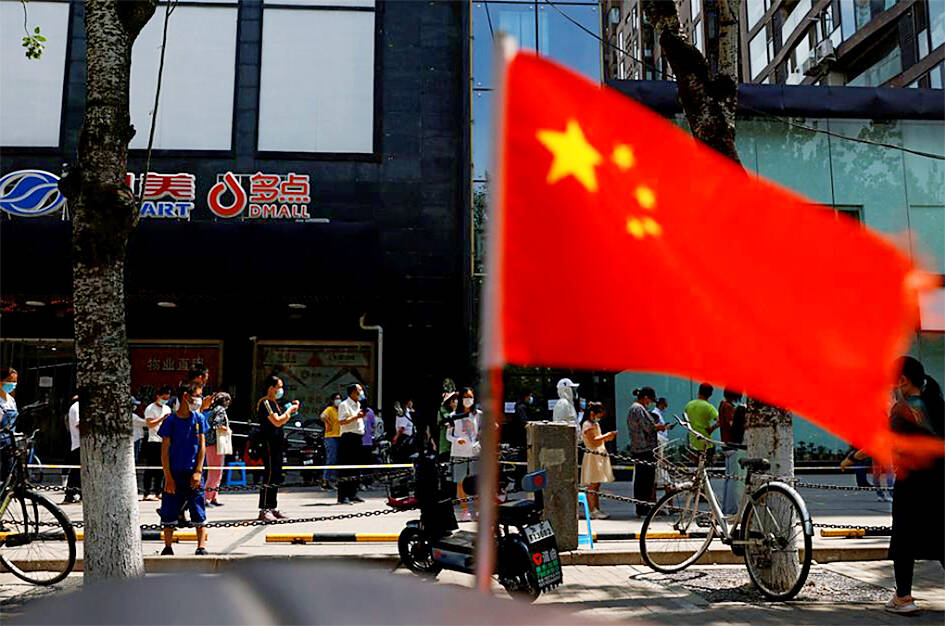China should encourage its citizens to join counterespionage work, including creating channels for individuals to report suspicious activity, as well as commending and rewarding them, the Chinese Ministry of State Security wrote on social media yesterday.
A system that makes it “normal” for the masses to participate in counterespionage must be established, said the ministry, which is the main agency overlooking foreign intelligence and anti-spying.
It made the comments in its first post on its WeChat account, which went live on Monday.

Photo: Reuters
In protecting itself from espionage, China would need the participation of its people in building a defense line, the ministry wrote.
The call to popularize work to counter spying among the public follows an expansion of China’s counterespionage law that took effect last month.
The law, which bans the transfer of information related to national security and interests has prompted criticism from the US, which has said that foreign companies in China could be punished for regular business activities.
The revised law allows authorities carrying out an anti-espionage probe to gain access to data, electronic equipment and information on personal property.
Political security is the top priority of national security, and the “core” of political security is the security of China’s political system, Chinese Minister of State Security Chen Yixin (陳一新) wrote last month in an article in a Chinese legal magazine. “The most fundamental is to safeguard the leadership and ruling position of the Communist Party of China and the socialist system with Chinese characteristics.”
In the past few years, China has arrested and detained dozens of Chinese and foreign nationals on suspicion of espionage, including an executive at Japanese drugmaker Astellas Pharma in March.
Australian journalist Cheng Lei (成蕾), accused by China of providing state secrets to another country, has been detained since September 2020.

BUILDUP: US General Dan Caine said Chinese military maneuvers are not routine exercises, but instead are ‘rehearsals for a forced unification’ with Taiwan China poses an increasingly aggressive threat to the US and deterring Beijing is the Pentagon’s top regional priority amid its rapid military buildup and invasion drills near Taiwan, US Secretary of Defense Pete Hegseth said on Tuesday. “Our pacing threat is communist China,” Hegseth told the US House of Representatives Appropriations Subcommittee on Defense during an oversight hearing with US General Dan Caine, chairman of the Joint Chiefs of Staff. “Beijing is preparing for war in the Indo-Pacific as part of its broader strategy to dominate that region and then the world,” Hegseth said, adding that if it succeeds, it could derail

CHIP WAR: The new restrictions are expected to cut off China’s access to Taiwan’s technologies, materials and equipment essential to building AI semiconductors Taiwan has blacklisted Huawei Technologies Co (華為) and Semiconductor Manufacturing International Corp (SMIC, 中芯), dealing another major blow to the two companies spearheading China’s efforts to develop cutting-edge artificial intelligence (AI) chip technologies. The Ministry of Economic Affairs’ International Trade Administration has included Huawei, SMIC and several of their subsidiaries in an update of its so-called strategic high-tech commodities entity list, the latest version on its Web site showed on Saturday. It did not publicly announce the change. Other entities on the list include organizations such as the Taliban and al-Qaeda, as well as companies in China, Iran and elsewhere. Local companies need

CROSS-STRAIT: The MAC said it barred the Chinese officials from attending an event, because they failed to provide guarantees that Taiwan would be treated with respect The Mainland Affairs Council (MAC) on Friday night defended its decision to bar Chinese officials and tourism representatives from attending a tourism event in Taipei next month, citing the unsafe conditions for Taiwanese in China. The Taipei International Summer Travel Expo, organized by the Taiwan Tourism Exchange Association, is to run from July 18 to 21. China’s Taiwan Affairs Office spokeswoman Zhu Fenglian (朱鳳蓮) on Friday said that representatives from China’s travel industry were excluded from the expo. The Democratic Progressive Party government is obstructing cross-strait tourism exchange in a vain attempt to ignore the mainstream support for peaceful development

ELITE UNIT: President William Lai yesterday praised the National Police Agency’s Special Operations Group after watching it go through assault training and hostage rescue drills The US Navy regularly conducts global war games to develop deterrence strategies against a potential Chinese invasion of Taiwan, aimed at making the nation “a very difficult target to take,” US Acting Chief of Naval Operations James Kilby said on Wednesday. Testifying before the US House of Representatives Armed Services Committee, Kilby said the navy has studied the issue extensively, including routine simulations at the Naval War College. The navy is focused on five key areas: long-range strike capabilities; countering China’s command, control, communications, computers, cyber, intelligence, surveillance, reconnaissance and targeting; terminal ship defense; contested logistics; and nontraditional maritime denial tactics, Kilby